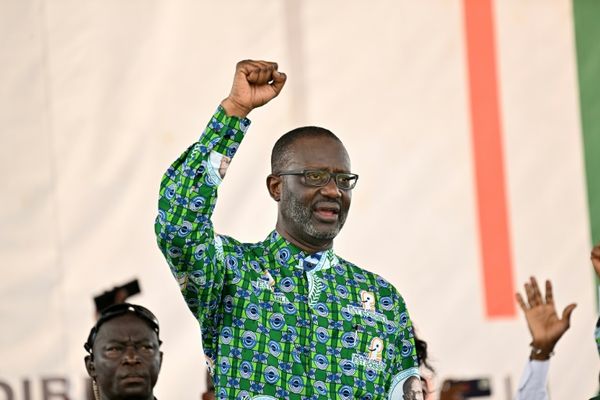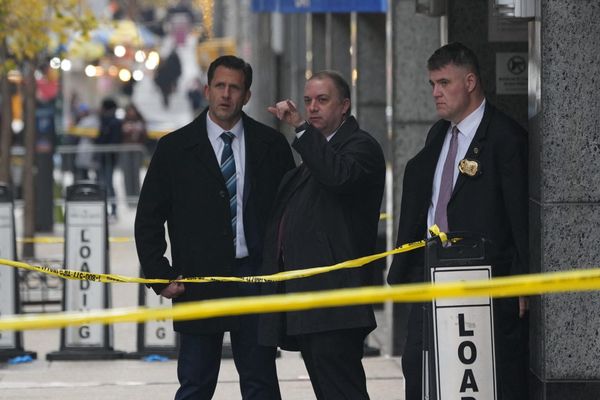Russia and the US are facing off in what's been described as the most serious geopolitical conflict since the end of the Cold War.
In the middle is Ukraine, led by former stand-up comedian and actor Volodymyr Zelenskyy.
According to opinion polls, the 44-year-old has performed poorly on the domestic political stage since his election three years ago but the jury is still out on his response to Russia's recent aggression.
'I promise, I will never let you down'
How Mr Zelenskyy, who had a law degree but no real political experience, became president is an incredible story of life imitating art.
An actor and executive in television and film, with his own production company Kvartal 95, he was previously best known for his role in the television show Servant of the People.
In the show, which first screened in 2015, he played a high school teacher elected president after a video of him denouncing corruption goes viral.
In 2018, Kvartal 95 registered a real political party with the same name as the television show and the following year, Mr Zelesnkyy won a landslide victory over the incumbent, Petro Poroshenko, with nearly 73 per cent of the vote.
"I promise, I will never let you down," he said at his victory celebration.
Kyiv-based journalist and researcher Olga Tokariuk said Mr Zelenskyy was elected mainly because he was a recognisable face rather than for any specific policies.
He had offered only vague promises to fight corruption and end the war with the separatist forces of Donetsk and Luhansk in the eastern Donbas region, she said.
"People supported and voted for him not as much because they liked him or his electoral program because he didn't actually have any concrete electoral program," said Ms Tokariuk, who is a non-resident fellow at the Centre for European Policy Analysis.
Sara Meger, a Ukraine expert and international relations lecturer at the University of Melbourne, said Ukrainians were simply tired of how a small number of extraordinarily wealthy individuals, disconnected from the everyday realities in the former Soviet state, had been running the country since independence in 1991.
"So Zelenskyy comes in on this platform of change and he represented a radical shift away from that oligarchic power that had a stranglehold on Ukrainian politics," Dr Meger said.
'People are really not happy with him at the moment'
Last October, halfway through his five-year term, Mr Zelenskyy's approval rating fell to a low of 25 per cent.
Olga Oleinikova, director of the Ukraine Democracy Initiative at the University of Technology Sydney, said people's disillusionment with his failure to resolve the separatist conflict in the Donbas region had been compounded by economic problems including increases in the cost of essential services like gas, electricity and water.
"People are really not happy with him at the moment," she said.
Meanwhile, the Servant of the People party continues to be plagued by corruption scandals, including in recent weeks when a video emerged of an MP trying to bribe a police officer after a serious car accident.
As Mr Zelenskyy has declined in the opinion polls, he has been accused of adopting the authoritarian tactics of his predecessors, shutting down opposition-owned media outlets on the grounds they were spreading Russian propaganda and using the courts to crack down on political opponents.
In December, Ukrainian authorities accused his predecessor and leading opposition rival, Mr Poroshenko, of state treason, aiding terrorist organisations and financing terrorism for buying coal from the separatist-controlled regions of Ukraine while in power.
Ms Tokariuk said the case was widely considered to be politically motivated and had the potential to undermine Ukraine's international reputation and democracy at a time when the country was facing an external threat.
"So I think this might be one of the crucial factors that would define what happens to Zelenskyy and his political fate in the second half of his presidency," she said.
"We will wait and see."
Not a 'complete failure'
Ms Tokariuk said she didn't consider Mr Zelenskyy to be a "complete failure".
She cited his foreign policy successes, like the recent trilateral alliance with the UK and Poland, strengthening military relationship with Turkey and his government's introduction of some anti-corruption reforms and institutions.
"Civil society is still diverse and can operate freely and there's also been some improvements from the point of view of human rights and LGBT rights," she said, adding that with some exceptions the media was still largely free.
Alexey Muraviev, an associate professor of National Security and Strategic Studies at Curtin University, said Mr Zelenskyy was wildly unqualified to run a country in such a position — particularly his lack of military service.
He pointed out other political missteps like making it compulsory for women to "register" with the military and referring to Ukrainians in the separatist areas as "creatures".
"He is a stand-up comedian," he said.
"He plays the piano. He is a pretty good actor, there is no doubt about it. But the country that is in a state of crisis requires an experienced head of state, an experienced and determined leader and a respected supreme commander in chief.
"So he's not being taken seriously by the majority of the electorate that voted for him and that's a massive problem."
However, Dr Meger said she was not sure that someone with a more relevant background would have done any better, dealing with the competing interests of entrenched oligarchs, powerful right-wing nationalists, separatists, the West and Russia.
"It's just the sort of constellation of interests and a lack of independent state capacity, internally in the government," she said.
Russian build-up 'no reason to panic'
Since late last year, the US and NATO have increasingly expressed concerns about a build-up of Russian troops within striking distance of the Ukrainian border.
Some 130,000 troops have been assembled as Russia conducts war games with Belarus and naval exercises in the Black Sea.
Russian President Vladimir Putin has denied having any plans to invade and on this, he and Mr Zelenskyy appear to be on the same page.
Mr Zelenskyy and his government have publicly talked down the possibility of a Russian invasion, saying that the troop build-up was "nothing new" and citing a similar build-up of about 100,000 troops last year.
After Ukraine ousted pro-Russian leader Viktor Yanukovych in 2014, Russia annexed the Crimea peninsula and separately helped the separatist forces in Donbas launch their war for independence.
Moscow has been conducting a so-called "hybrid war" against Ukraine, utilising cyberattacks, propaganda and military intimidation ever since.
The situation was "under control" and there was "no reason to panic", Mr Zelenskyy has said in recent weeks.
He has publicly been more concerned about the economic impact of fear stoked by the threat.
Dr Meger said Mr Zelenskyy appeared to believe that while integration with Europe was what was best for Ukraine economically and for the future, the rhetoric about an imminent invasion was actually increasing the risk to the country's security right now.
"In short, what he's got to do is a delicate balancing act of trying to forge alliances without aggravating their nearest and most powerful neighbour, too much," she said.
Mr Zelenskyy's attempts to keep Ukrainians calm appeared to be working so far, said Ms Tokariuk.
"So there is no panic in Ukraine," she said. "People try to live their normal lives: they go to work, they send their children to school, they do their daily routine tasks."
Russia wants Ukraine to be a 'buffer'
Dr Muraviev said he did not believe Moscow wanted to launch a full-scale invasion of Ukraine.
Instead, Mr Putin was playing a game of "brinkmanship" as he did last year and during other negotiations with the US, he said.
"Russia wants to see Ukraine as a neutral buffer zone [against NATO]," he said.
Moscow last December issued a series of demands including that Ukraine never be allowed to join NATO.
Dr Muraviev said Mr Putin's aim in Ukraine was to cause internal unrest and to deter the Ukrainians from attacking or attempting to seize control over the separatist regions.
"Ukraine has just become an area of proxy conflict between Russia and the United States," he said.
He noted that to the domestic audience, Mr Zelenskyy's message was that the US was exaggerating the threat of a Russian invasion and damaging Ukraine's economy as "political blackmail" to get Ukraine to make more concessions to the separatists.
"He kind of hopes no-one understands Ukrainian when he speaks to the domestic audience and whatever he says in English is his official line," he said.
One of the few possible ways out of the conflict is for Ukraine and Russia to follow through with the so-called Minsk treaty, first negotiated in Normandy, which would give some autonomy to the separatist regions.
Ms Tokariuk, the Kyiv-based journalist, said any concessions to the separatists would be "extremely unpopular" in Ukraine.
She pointed out that there had been deadly clashes in Kyiv when Mr Poroshenko had attempted to pass a law giving more autonomy to the regions.
"I think that now with the Normandy negotiations renewed at the level of advisors, there might be some attempts by France and Germany to pressure Ukraine into these kind of concessions, but I think it will be very, very difficult for them to sell them to Ukraine," she said.
"Especially now when Russia is basically holding a gun to Ukraine's head.
"Forcing Ukraine into concessions in this situation would look extremely cynical, and will absolutely not be accepted inside Ukraine."
Ukrainians 'tired' of regime changes by revolution
Despite saying during the 2019 election campaign that he would only serve one term, Mr Zelenskyy now says he has not decided whether he will run again.
Dr Muraviev said that if Mr Zelenskyy's popularity continued to decline, it was possible the people of Ukraine could get rid of him before the next election in 2024.
"This is something that's been entertained even though I think the Ukrainians are getting a bit tired of having these regime changes by revolution," he said.
He added that while Mr Putin would be happy to see Mr Zelenskyy flounder, he probably didn't want to see him replaced in such a manner.
If he was, a nationalist who was even more fervently anti-Russian would almost certainly take his place.
"So there may be a coup, but not a pro-Russian coup by any chance," he said.
Dr Meger said that ultimately it wouldn't matter much to Ukraine as a country if Mr Zelenskyy was replaced.
"Whoever's in power is going to have to make a decision about whether their interests are better met aligning more with Europe or with Russia, and both [paths] are going to have repercussions," she said.







